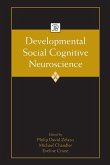David B. Pillemer / Sheldon H. White (eds.)
Developmental Psychology and Social Change
Herausgeber: Pillemer, David B.; White, Sheldon H.
David B. Pillemer / Sheldon H. White (eds.)
Developmental Psychology and Social Change
Herausgeber: Pillemer, David B.; White, Sheldon H.
- Broschiertes Buch
- Merkliste
- Auf die Merkliste
- Bewerten Bewerten
- Teilen
- Produkt teilen
- Produkterinnerung
- Produkterinnerung
The book's unique emphasis is on connections between research, history, and policy.
Andere Kunden interessierten sich auch für
![Developmental Science Developmental Science]() B. Cairns / H. Elder / Elizabeth Jane Costello (eds.)Developmental Science48,99 €
B. Cairns / H. Elder / Elizabeth Jane Costello (eds.)Developmental Science48,99 €![The Developmental Scientist's Companion The Developmental Scientist's Companion]() J. Steven ReznickThe Developmental Scientist's Companion34,99 €
J. Steven ReznickThe Developmental Scientist's Companion34,99 €![Pillars of Developmental Psychology Pillars of Developmental Psychology]() Pillars of Developmental Psychology57,99 €
Pillars of Developmental Psychology57,99 €![Cultural and Contextual Perspectives on Developmental Risk and Well-Being Cultural and Contextual Perspectives on Developmental Risk and Well-Being]() Cultural and Contextual Perspectives on Developmental Risk and Well-Being40,99 €
Cultural and Contextual Perspectives on Developmental Risk and Well-Being40,99 €![Developmental Social Cognitive Neuroscience Developmental Social Cognitive Neuroscience]() Developmental Social Cognitive Neuroscience71,99 €
Developmental Social Cognitive Neuroscience71,99 €![Developmental Psychology Developmental Psychology]() Keith RichardsonDevelopmental Psychology68,99 €
Keith RichardsonDevelopmental Psychology68,99 €![Developmental Psychology: The Growth of Mind and Behavior Developmental Psychology: The Growth of Mind and Behavior]() Frank KeilDevelopmental Psychology: The Growth of Mind and Behavior204,99 €
Frank KeilDevelopmental Psychology: The Growth of Mind and Behavior204,99 €-
-
-
The book's unique emphasis is on connections between research, history, and policy.
Hinweis: Dieser Artikel kann nur an eine deutsche Lieferadresse ausgeliefert werden.
Hinweis: Dieser Artikel kann nur an eine deutsche Lieferadresse ausgeliefert werden.
Produktdetails
- Produktdetails
- Verlag: Cambridge University Press
- Seitenzahl: 412
- Erscheinungstermin: 28. April 2015
- Englisch
- Abmessung: 229mm x 152mm x 24mm
- Gewicht: 666g
- ISBN-13: 9780521533607
- ISBN-10: 0521533600
- Artikelnr.: 22112325
- Herstellerkennzeichnung
- Libri GmbH
- Europaallee 1
- 36244 Bad Hersfeld
- gpsr@libri.de
- Verlag: Cambridge University Press
- Seitenzahl: 412
- Erscheinungstermin: 28. April 2015
- Englisch
- Abmessung: 229mm x 152mm x 24mm
- Gewicht: 666g
- ISBN-13: 9780521533607
- ISBN-10: 0521533600
- Artikelnr.: 22112325
- Herstellerkennzeichnung
- Libri GmbH
- Europaallee 1
- 36244 Bad Hersfeld
- gpsr@libri.de
David B. Pillemer is the Dr. Samuel E. Paul Professor of Developmental Psychology at the University of New Hampshire. His research specialty is authobiographical memory across the life span. He has studied memory development in children, memories of adolescence, 'flashbulb' memories of momentous events and memories of educational experiences.
Sheldon White is John Lindsey Professor of Psychology Emeritus at Harvard University. A developmental psychologist, he has done research on children's learning, attention, and memory. He has chaired committees concerned with the development of a research program for Head Start. He also has been chair of the Board on Children and Families of the National Research Council.
Sheldon White is John Lindsey Professor of Psychology Emeritus at Harvard University. A developmental psychologist, he has done research on children's learning, attention, and memory. He has chaired committees concerned with the development of a research program for Head Start. He also has been chair of the Board on Children and Families of the National Research Council.
Preface; Introduction: what kind of science is developmental psychology?
Sheldon H. White and David B. Pillemer; Part I. The Developing Child:
Global and Historical Perspectives: 1. The globalization of developmental
psychology Charles M. Super; 2. A socio-historical perspective on
autobiographical memory development Michelle D. Leichtman and Qi Wang; 3.
Toward a better story of psychology: Sheldon White's contributions to the
history of psychology, a personal perspective William McKinley Runyan; Part
II. Designing Child and Family Policies: 4. The effects of welfare reform
and poverty policies on children and families Aletha C. Huston; 5. The
disconnect between research and policy on child care Deborah Phillips and
Kathleen McCartney; 6. Child development and child care policy: modest
impacts Ron Haskins; Part III. Designing Child Health Policies: 7.
Developmental epidemiology: the role of developmental psychology for Public
Health in the 21st century Stephen L. Buka; 8. Ignoring behavioral science:
practices and perils Lewis P. Lipsitt; Part IV. Designing Effective
Learning Environments for Children and Adolescents: 9. A
cultural/historical view of schooling in human development Barbara Rogoff,
Maricela Correa-Chavez and Marta Navichoc Cotuc; 10. The rise of the
American Nursery School: laboratory for a science of child development
Barbara Beatty; 11. Actualizing potentials: learning through psychology's
recurrent crises Michael Cole and Jaan Valsiner; 12. The rise of a
right-wing culture in German youth: the effects of social transformation,
identity construction, and context Wolfgang Edelstein; 13. Learning
potential assessment: where is the paradigm shift? Alex Kozulin; 14.
Teaching as a natural cognitive ability: implications for classroom
practice and teacher education Sidney Strauss.
Sheldon H. White and David B. Pillemer; Part I. The Developing Child:
Global and Historical Perspectives: 1. The globalization of developmental
psychology Charles M. Super; 2. A socio-historical perspective on
autobiographical memory development Michelle D. Leichtman and Qi Wang; 3.
Toward a better story of psychology: Sheldon White's contributions to the
history of psychology, a personal perspective William McKinley Runyan; Part
II. Designing Child and Family Policies: 4. The effects of welfare reform
and poverty policies on children and families Aletha C. Huston; 5. The
disconnect between research and policy on child care Deborah Phillips and
Kathleen McCartney; 6. Child development and child care policy: modest
impacts Ron Haskins; Part III. Designing Child Health Policies: 7.
Developmental epidemiology: the role of developmental psychology for Public
Health in the 21st century Stephen L. Buka; 8. Ignoring behavioral science:
practices and perils Lewis P. Lipsitt; Part IV. Designing Effective
Learning Environments for Children and Adolescents: 9. A
cultural/historical view of schooling in human development Barbara Rogoff,
Maricela Correa-Chavez and Marta Navichoc Cotuc; 10. The rise of the
American Nursery School: laboratory for a science of child development
Barbara Beatty; 11. Actualizing potentials: learning through psychology's
recurrent crises Michael Cole and Jaan Valsiner; 12. The rise of a
right-wing culture in German youth: the effects of social transformation,
identity construction, and context Wolfgang Edelstein; 13. Learning
potential assessment: where is the paradigm shift? Alex Kozulin; 14.
Teaching as a natural cognitive ability: implications for classroom
practice and teacher education Sidney Strauss.
Preface; Introduction: what kind of science is developmental psychology?
Sheldon H. White and David B. Pillemer; Part I. The Developing Child:
Global and Historical Perspectives: 1. The globalization of developmental
psychology Charles M. Super; 2. A socio-historical perspective on
autobiographical memory development Michelle D. Leichtman and Qi Wang; 3.
Toward a better story of psychology: Sheldon White's contributions to the
history of psychology, a personal perspective William McKinley Runyan; Part
II. Designing Child and Family Policies: 4. The effects of welfare reform
and poverty policies on children and families Aletha C. Huston; 5. The
disconnect between research and policy on child care Deborah Phillips and
Kathleen McCartney; 6. Child development and child care policy: modest
impacts Ron Haskins; Part III. Designing Child Health Policies: 7.
Developmental epidemiology: the role of developmental psychology for Public
Health in the 21st century Stephen L. Buka; 8. Ignoring behavioral science:
practices and perils Lewis P. Lipsitt; Part IV. Designing Effective
Learning Environments for Children and Adolescents: 9. A
cultural/historical view of schooling in human development Barbara Rogoff,
Maricela Correa-Chavez and Marta Navichoc Cotuc; 10. The rise of the
American Nursery School: laboratory for a science of child development
Barbara Beatty; 11. Actualizing potentials: learning through psychology's
recurrent crises Michael Cole and Jaan Valsiner; 12. The rise of a
right-wing culture in German youth: the effects of social transformation,
identity construction, and context Wolfgang Edelstein; 13. Learning
potential assessment: where is the paradigm shift? Alex Kozulin; 14.
Teaching as a natural cognitive ability: implications for classroom
practice and teacher education Sidney Strauss.
Sheldon H. White and David B. Pillemer; Part I. The Developing Child:
Global and Historical Perspectives: 1. The globalization of developmental
psychology Charles M. Super; 2. A socio-historical perspective on
autobiographical memory development Michelle D. Leichtman and Qi Wang; 3.
Toward a better story of psychology: Sheldon White's contributions to the
history of psychology, a personal perspective William McKinley Runyan; Part
II. Designing Child and Family Policies: 4. The effects of welfare reform
and poverty policies on children and families Aletha C. Huston; 5. The
disconnect between research and policy on child care Deborah Phillips and
Kathleen McCartney; 6. Child development and child care policy: modest
impacts Ron Haskins; Part III. Designing Child Health Policies: 7.
Developmental epidemiology: the role of developmental psychology for Public
Health in the 21st century Stephen L. Buka; 8. Ignoring behavioral science:
practices and perils Lewis P. Lipsitt; Part IV. Designing Effective
Learning Environments for Children and Adolescents: 9. A
cultural/historical view of schooling in human development Barbara Rogoff,
Maricela Correa-Chavez and Marta Navichoc Cotuc; 10. The rise of the
American Nursery School: laboratory for a science of child development
Barbara Beatty; 11. Actualizing potentials: learning through psychology's
recurrent crises Michael Cole and Jaan Valsiner; 12. The rise of a
right-wing culture in German youth: the effects of social transformation,
identity construction, and context Wolfgang Edelstein; 13. Learning
potential assessment: where is the paradigm shift? Alex Kozulin; 14.
Teaching as a natural cognitive ability: implications for classroom
practice and teacher education Sidney Strauss.








